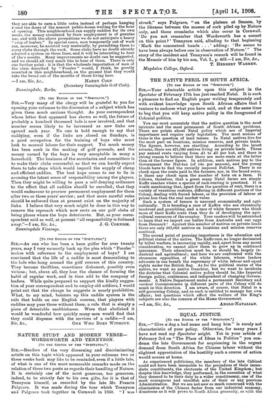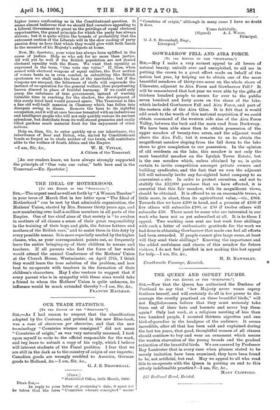EQUAL JUSTICE.
[To THE EDITOR OF THE " SPECTATOR:1 SIR,—" Give a: dog a bad name and hang him" is surely not characteristic of your policy. Otherwise, for many years I have not read my Spectator aright. Yet in your article of February 3rd on "The Place of Ideas in Politics" you con- demn the late Government for acquiescing in the urgent demand from South Africa for Chinese labour without the slightest appreciation of the hostility such a course of action would arouse at home.
As experienced politicians, the members of the late Cabinet could not have been insensible to the prejudices of their imme- diate constituents, the electorate of the United Kingdom; but despite this knowledge, they performed, in the execution of what they deemed to be their duty to a wider constituency, one of the most courageous and unselfish acts of their or any previous Administration. But we are not now so much concerned with the elimination of the Chinese factor from our industrial economy, disastrous as it will prove to South Africa generally, as with the higher issues confronting us in the Constitutional question. It seems almost ludicrous that we should find ourselves appealing to a Liberal Government to grant us the privilege of equal electoral opportunities, the grand principle for which the party has always striven; but it is quite within the bounds of probability that the extremest section of the Liberals will in the slow cooling of party passion deny us here that which they would give with both hands to the meanest of his Majesty's subjects at home.
Now, Mr. Spectator, your voice has always been uplifted in the cause of justice. Help us who ask for no more than justice. All will yet be well if the British population are not denied electoral equality with the Boers. We want that equality as expressed in the term, "One vote one value." If, then, when armed with electoral weapons of equal calibre, the Boer section of voters beats us in even combat, in submitting like British sportsmen we shall make the best of the inevitable; but if the weapons are unequal, the bitterness of strife will supersede the instinct of co-operation for the general welfare, thus perpetuating barren discord in place of fruitful harmony. If we could only grasp the substance of true government, instead of wasting valuable tune in reaching for the shadow, the development of this sorely tried land would proceed apace. The Transvaal is like a fine old well-built mansion in Chancery which has fallen into disrepair owing to disuse. Remove the bans to its rightful occupation, and it will at once become tenanted with an industrious and intelligent people who will not only quickly restore its ancient splendour, but distribute from its well-stored granaries and easily tilled gardens much material fruit for the enjoyment of other nations.
Help us, then, Sir, to enter quickly U) fl our inheritance, the inheritance of Boer and Briton, who, united by Constitutional bonds so forged as to chafe neither of the twain, will contribute alike to the welfare of South Africa and the Empire.
A Citizen of the Transvaal.
[As our readers know, we have always strongly supported the principle of "One vote one value," both here and in the Transvaal.—En. Spectator.]







































 Previous page
Previous page